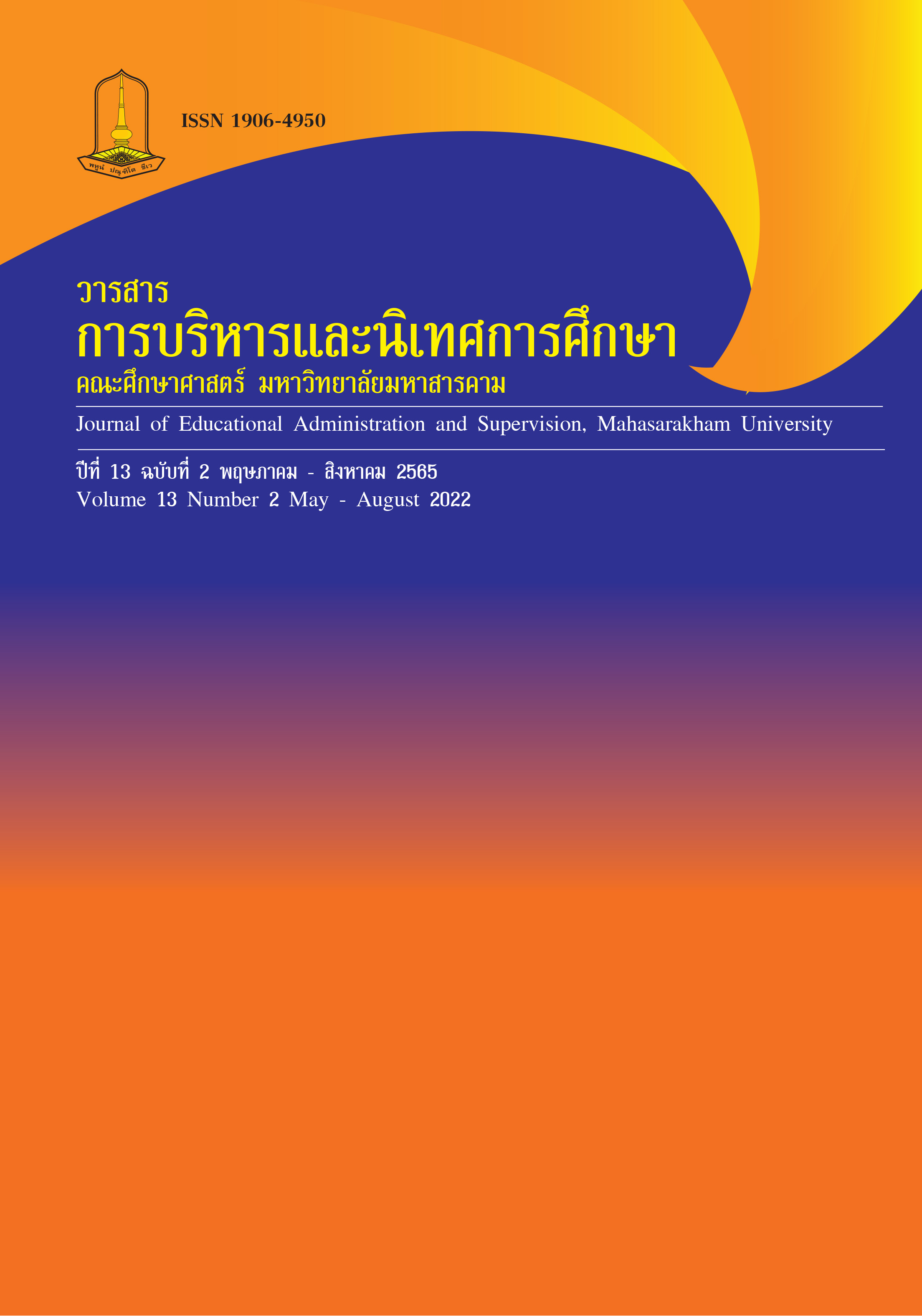Development Guidelines for Strengthening the Desirable Characteristics of Armed Forces Academies Preparatory School Students
Main Article Content
Abstract
The objectives of this study are 1) to study the current desirable characteristics ofthe students of Armed Forces Academies Preparatory School and 2) to propose guidelinesor the development of the desirable characteristics of the students of Armed Forces
Academies Preparatory School, employing the combined research designed, both qualitativeand quantitative approaches. The data collections were conducted through questionnairesdistributed to 186 respondents including instructors, administrative staff, and class presidentsworking at Armed Forces Preparatory School. In-depth interview was done with threerepresentatives selected from executives or leaders. The study revealed the existed highlevel of desirable characteristics of the Armed Forces Academies Preparatory School students.The highest average values are attitudes followed by morality and ethics, military disciplines
and leadership, military and academic knowledge, and physical fitness, respectively. Thestudy found that there are 5 guidelines for implementing the development and strengthening of the desirable characteristics of Armed Forces Academies Preparatory School studentsas follows: 1 emphasizing and strengthening the desirable characteristics by specifyingpractical evaluation and follow-up mechanism, 2)promoting the prioritization of the mostpressing and problematic desirable characteristics, 3 designing the activities to strengthendesirable characteristics in collaboration with all related and responsible agencies,4) promoting appropriate, safe and productive use of the digital platform, and 5) utilizingdigital platform to evaluate and organize activities to strengthen the desirable characteristics. As to each aspect of the development guidelines for strengthening the desirable characteristics of Armed Forces Academies Preparatory School students, the study found additional 23 sub-guidelines which the Armed Forces Academies Preparatory School can apply to further development and strengthening of desirable characteristics of its student to be in compliance with the modern context and the ever-changing tide in the future.
Downloads
Article Details
References
กระทรวงศึกษาธิการ สำนักงานคณะกรรมการการศึกษาขั้นพื้นฐาน. (2553). แนวทางการพัฒนา การวัดและการประเมินคุณลักษณะอันพึงประสงค์ตามหลักสูตรแกนกลางการศึกษาขั้นพื้นฐานพุทธศักราช 2551. สืบค้นจาก https://sgs.boppobec.info/menu/Data/measurmentGuide.pdf
เกรียงศักดิ์ เจริญวงศ์ศักดิ์. (2552). ภาพอนาคตและคุณลักษณะของคนไทยที่พึงประสงค์. วารสารการบริหารและพัฒนา มหาวิทยาลัยมหาสารคาม, 1(3), 154-162. สืบค้นจาก http://journal. drchalard.com/journal/1/1-3/aded_1_3_11.pdf
พรรณพิลาศ กุลดิลก (2560). การขับเคลื่อนสังคมผ่านสื่อใหม่ในยุคโลกาภิวัตน์. วารสารวิชาการมนุษยศาสตร์และสังคมศาสตร์, 25(49), 59-77. สืบค้นจากhttps://so06.tci-thaijo.org/index.php/husojournal/article/view/99215/77122
ภัคภณ สนิทสม และณัฐพล จารัตน์ (2558). คุณลักษณะผู้นำ ทางทหารที่พึงประสงค์ของกองทัพไทย. วารสารนักบริหาร, 35(1), 75-86. สืบค้นจากhttp://www.ar.or.th/ImageData/Magazine/20055/DL_10531.pdf?t=637249371256601921
มหาวิทยาลัยขอนแก่น คณะศึกษาศาสตร์. (2551). คุณลักษณะอันพึงประสงค์ของนักเรียน. วารสารศึกษาศาสตร์ ฉบับวิจัยบัณฑิตศึกษา, 2(1), 25-33.
โรงเรียนเตรียมทหาร. (2560). หลักสูตรโรงเรียนเตรียมทหาร พุทธศักราช 2554 (ฉบับปรับปรุงพุทธศักราช 2560).
วชิรดล คำศิริรักษ์, อุษา ปราบหงษ์ และ ถาดทอง ปานศุภวัชร. (2559). การพัฒนารูปแบบกิจกรรมเสริมสร้างคุณลักษณะอันพึงประสงค์สำ�หรับนักเรียนชั้นมัธยมศึกษาตอนต้น. วารสารมหาวิทยาลัยนครพนม, 6(1), 97-105. สืบค้นจาก https://so03.tci-thaijo.org/index.php/npuj /article/view/53363/44297
วรพจน์ วงศ์กจิ รุ่งเรือง. (2561). คู่มอื พลเมืองดิจิทัล. สบื ค้นจาก https://thaidigizen.com/wp-content/uploads/2018/06/DigitalCitizenship-Book-ok.pdf
วรลักษณ์ สงวนแก้ว. (2563). พลเมืองดิจิทัล: Digital Citizens. สืบค้นจาก https://www.stou.ac.th/study/sumrit/1-59(500)/page2-1-59(500).html
สรานนท์ อินทนนท์. (2561). ความฉลาดทางดิจิทัล. ใน เข็มพร วิรุณราพันธ์ และลักษมี คงลาภ (บ.ก.).สืบค้นจาก http://cclickthailand.com/ fact-sheet-ความฉลาดทางดิจิทัล-dq-digital-intelligenc/
สุรศักดิ์ ประทานวรปัญญา. (2557). คุณลักษณะที่พึงประสงค์ของนักเรียนนายเรือ โรงเรียนนายเรือตามความคาดหวังของผู้บังคับบัญชาในส่วนบัญชาการกองทัพเรือ (Master’s thesis). สืบค้นจาก http://digital_collect.lib.buu.ac.th/dcms/files/55930008.pdf
สำนักงานเลขาธิการสภาผู้แทนราษฎร กลุ่มงานคณะกรรมาธิการกิจการเด็ก เยาวชน สตรี ผู้สูงอายุและผู้พิการ. (2562). เอกสารบทความวิชาการด้านเด็ก เยาวชน สตรี ผู้สูงอายุและผู้พิการเพื่อประกอบการพิจารณาของคณะกรรมาธิการ. สืบค้นจาก https://www.parliament. go.th/
ewtcommittee/ewt/25_people/ewt_dl_link.php?nid=101&filename=index
สำนักงานบริหารงานมัธยมศึกษาตอนปลาย สำนักงานคณะกรรมการการศึกษาขั้นพื้นฐาน. (2552).แนวทางการจัดการเรียนรู้ในโรงเรียนมาตรฐานสากล. เอกสารสนับสนุนการดำเนินงานโรงเรียนมาตรฐานสากล.


